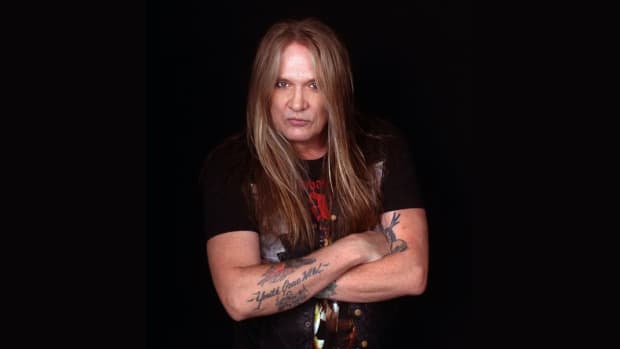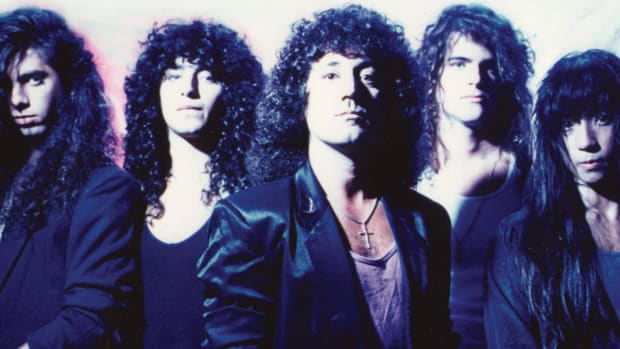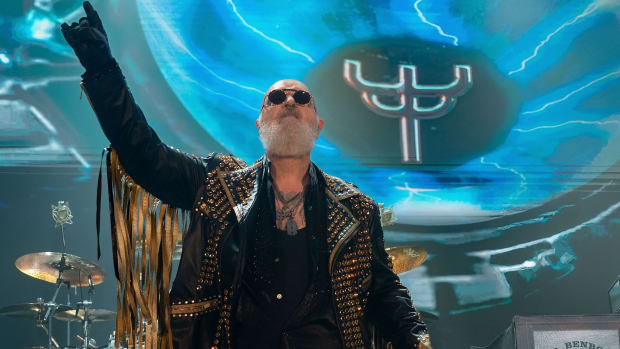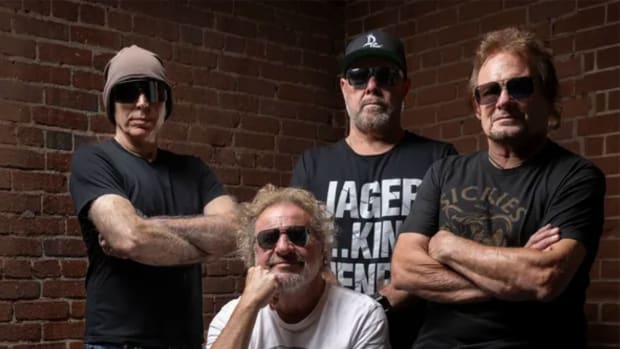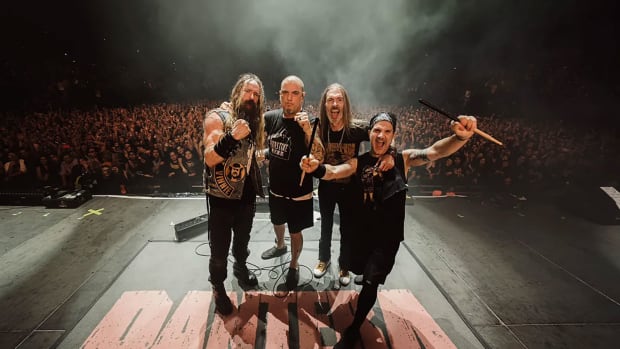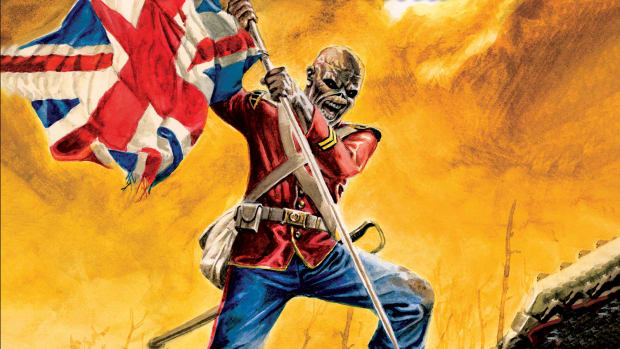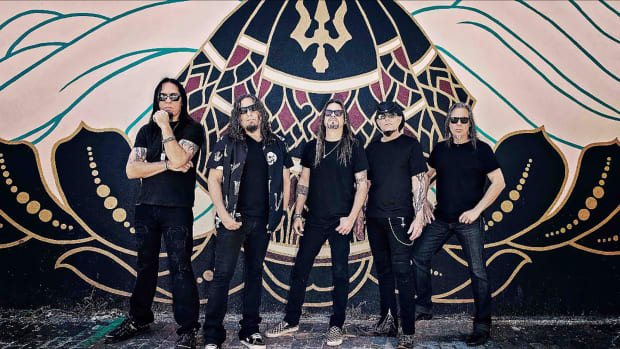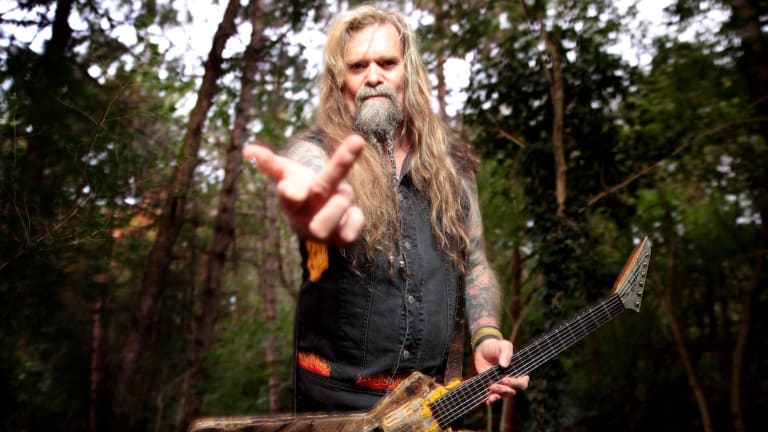
Chris Holmes: 'I'm not the only one who ever drank a lot of alcohol or did a lot of drugs in this business'
With W.A.S.P., Chris Holmes proved to be a larger-than-life character capable of eliciting throaty swells from various presto guitars, mad scientist rigs and even an axe plastered with Budweiser's signature insignia across it.
Of course, the undying image of a young Holmes lying in a pool whilst labeling himself both a "full-blown alcoholic" and "a piece of crap" haunts the now 64-year-old rocker to this day. No matter that he was an integral component of classic W.A.S.P., recently bested cancer or was the subject of the redemption-filled biopic Mean Man – the infamous scene plucked from Penelope Spheeris's The Decline of Western Civilization Part II: The Metal Years is often what defines Holmes.
But Holmes isn't bothered. For a man who looks more like a grizzled biker than a shredding guitarist, it's not shocking that toughness is at the forefront of his mental vocabulary. When asked about the impact of that film scene, Holmes shrugs: "Some people go, 'Man, that's the best part I've ever seen in a movie.' People that are druggies, and all the rockers, man, they love it. It just happened to be the circumstance that was happening during that evening. But then again, that doesn't mean it was reality. That was a part of my reality and part of what it took to get to the show. So, it doesn't bother me. What does bother me is that Spheeris never paid me. She could call me personally to participate but couldn't be bothered to fucking pay me to be in her movie."
However, despite his legendary drug intake and propensity for guzzling beer, Holmes was more than your typical party animal masquerading as a rock star. After all, with his former partner in W.A.S.P., Blackie Lawless, Holmes made shock rock cool again in the '80s, with a ballistic stage show that included aggressive imagery, snarling guitars, guttural wails and raw meat being strewn about the place. And while Holmes wasn't against the wild stage antics, he preferred to focus, he says, on helping to create the sonic bedrock that W.A.S.P. was built upon.
"I'm not schooled on the guitar stuff," Holmes admits. "I don't read music. I don't even read English. I've never read a book in my life. I've got a bad case of dyslexia. I'm not schooled in music, but I know a lot about frequencies, EQ, etc. And I'll tell you this: W.A.S.P.'s sound came directly because of my guitar playing. The music was written around the way I play guitar."
Aboard for a string of classic albums, including 1984’s self-titled debut and 1985’s The Last Command, Holmes departed the band in 1990, though he did return in 1995 for an additional seven years, leaving for good in 2002. Considering the bad blood that still boils between Holmes and Lawless to this day, it would be easy to assume that the guitarist looks back in anger. But he says that's not the case.
"Things were bound to fail because Blackie is a narcissist," Holmes says. "It could never work because he would never let it work. I wanted W.A.S.P. to stay together and be huge like Metallica. But that's not how it turned out. Instead, it became a joke of rotating members. If we had been able to work together, W.A.S.P. wouldn't be what it is now; it could have been huge like Metallica. Because if you look at Metallica, James Hetfield doesn't act like he's above anyone else in that band like Blackie Lawless does. But I'm not jealous; I'm proud to say I came up around the same time as Metallica. I focus on the positives and am proud of what I accomplished. If I didn't do that, the truth is that there's not much left to think about."
Holmes currently resides in France, but on a recent trip to L.A. he dialed in to Metal Edge to discuss getting sober, his musings on the unforgettable poolside scene that's come to define him, his strained relationship with Blackie Lawless and his outlook as he moves ahead.
What led you to leave L.A. for France?
Chris Holmes: Well, when I was back in my old stomping grounds, the cops harassed the hell out of me. I got tired of constantly being bothered by the cops, who would always profile me and pull me over. But to them, I look like a drug addict, so, of course, they're gonna do that shit. But in France, no one bothers me, which is nice. L.A. isn't any good anymore for that type of music. I couldn't get a group going out in L.A., man. I tried, and I tried, so maybe it's the way I lived when I was there.
Considering your legacy, one would think you'd have no trouble putting a band together.
Holmes: The big problem I have is my height. I'm 6' 6", so nobody wants to stand next to me on stage. Most singers don't want the guy playing guitar to stand taller than them onstage, especially if any ego is involved. It worked in W.A.S.P. with Blackie [Lawless] because he's 6' 5", so we made it work to an extent while on stage. But, man, L.S.D. is a real thing. Do you know what that is?
The dreaded 'Lead Singer Disease.'
Holmes: Ah, so you know all about it. [laughs] Most singers have huge egos and don't want to be standing next to Andre the Giant or Hulk Hogan, you know? I mean… it never bothered me, but a lot of guys are uncomfortable with that. The way I see it is it's entertaining and makes for a cool show. But, man, after my time in W.A.S.P., Lead Singer Disease is a gnarly thing to work with. It's not fun.
I think a lot of people have the wrong impression about you due to your scene in The Decline of West Civilization Part II. But the Mean Man documentary seems to have helped change that.
Holmes: Yeah, that's true. The Mean Man thing showed a different aspect of what kind of person I am. I think a lot of people used to think that I just drank my life away when I wasn't on the road. And that sucks because The Decline of Western Civilization just captured one night of my life.
Do you feel that scene accurately depicted who you were at that time?
Holmes: I'm not the only one who has ever drank a lot of alcohol or did a lot of drugs in this business. The big thing is I'm willing to talk about it. I did those things back then, but that scene was amplified. And it's interesting because it boosted my image to some people, and to others took it down. There was no middle-of-the-road regarding what people thought of me after it was filmed.
Does it bother you that you're not given proper credit regarding the legacy of W.A.S.P.?
Holmes: The only thing that really bothers me about the whole Blackie situation is that he gets all the credit for what he's doing. But that's all right; I'm done worrying about it, and I've gotten over it. Unlike some people, I can still walk on my own, and I stand up on my own two feet. I can still play, and I've got a smile on my face. And I enjoy that more than getting any money out of the past. I enjoy playing in front of people and watching the smiles on their faces. That makes me happy.
But even when it comes to the sound of W.A.S.P., there are many things that I fought tooth and nail for. Blackie would want me to play a certain way, or he'd want to change something when I came down to play, and I'd say, "Hey, if that's what you want, I quit. I won't do it that way. I'm leaving." And I had to do that a few times, saying to him, "If I can't play guitar the way I want, then I'm not playing at all. Go get someone else." And I'll tell you this — Blackie hated the way I played. He just hated it.
That's hard to believe, considering your style was a massive part of the W.A.S.P. sound.
Holmes: My way of playing guitar was the entire sound. But he hated the way I played. He hated how I did solos, how I hit chords, all of it. Even when I came back in '95, Blackie said, "You need to start playing guitar differently." I was like, "Why?" And Blackie was like, "You really need to reinvent yourself." And I just told him what I always did, "I'm happy with how I am. I'm not changing for you or anyone else."
Would you go as far as to say that Blackie needed you more than you needed him?
Holmes: Yeah, I would. That was definitely the case. And if that's not true, why did Ozzy Osbourne have me audition for him? I auditioned for the band after Randy [Rhoads] passed. Not many people remember that, but it's true. I was all over the L.A. circuit for years before anyone even knew who Blackie was. I was a known entity by the time he got there.
Was it difficult to walk away from W.A.S.P.?
Holmes: It didn't matter because if I didn't walk away, Blackie would have just gone behind my back and gotten someone to take my spot. He'd be trying other people out behind my back, but to my face, everything was fine. For example, the second time around, he'd already tried Darrell [Roberts] out, and I had no idea. But I didn't care because I had already come to learn how much of a narcissist he was. So, it didn't shock me. That shit started back in the '80s when he insisted on being on the cover by himself.
That begs the question: why did you return in the mid '90s?
Holmes: I thought it could be different but quickly learned it wouldn't be. The last album I did in the '80s, The Headless Children, was only as good as it was because I was doing all the guitars. I told him, "Let me do this my way, or I'm quitting." And when I came back, I thought it would be better, but as we began to work on Kill Fuck Die, I found out the situation wasn't any better.
How so?
Holmes: I quickly realized that I was working with a massive narcissist. Blackie was in control of the whole record, and guess what happened — Kill Fuck Die sounds like shit. And the reason why that record sounds the way it does is that Blackie Lawless was really scared of Marilyn Manson taking his spot in rock 'n' roll. So, he had to try and outdo Marilyn Manson. I hate that record. I know some people love it, but to me, it's a piece of crap.
Do you feel being in W.A.S.P. exasperated your drug and alcohol intake?
Holmes: Nah, not really. I used drugs and drank heavily way before I was in W.A.S.P. I was heavily into all that by the time I was 15 or 16. Back then, it's what came along with being in the music business. And as I got older, it's not like I was gonna stop, you know? When you ain't got nothing to do, the way I thought was, "I may as well get fucked up." And the fact that I grew up in the '60s and '70s during a time when the idea of saying no to drugs wasn't a thing didn't help either. You were considered an outcast if you didn't do drugs back then. And then, once I got out on the road as a touring musician, drugs, and alcohol seemed to be my only friend. It was easier to get fucked up than to listen to somebody with narcissism on the bus all the time.
Has getting sober changed your outlook?
Holmes: Well, I got sober eight years ago. I quit drinking on February 5, 1996. I still did drugs, but that's when I stopped drinking. But when I went to Europe, I decided to quit everything. I just couldn't find any chemicals, so I stopped doing all of it. And it's given me a different outlook on everything, which is good, but I probably play guitar worse than I did in the '80s. Well, maybe not worse, but it's different.
Now, I play what I feel in the moment. I don't even try to play the same solo anymore. I like the idea of doing something different each time, which I always wanted to do. I admire people who can improvise and have always wanted to do that myself. But when I was with W.A.S.P., Blackie hated the idea, and I couldn't improvise. I had to play each solo note for note, but I found that boring because it's not how I learned to play guitar.
I guess it goes without saying that there will be no third act with W.A.S.P.
Holmes: Not unless Blackie wants to pay me my publishing and give me what I deserve and am owed. If he did that, maybe I'd consider it. But he won't. So, it's not worth it to be around the people who make me depressed. My goal is to stay clean and cancer free. I'm focused on the shows I've got coming up in Europe. And then we're working on getting some shows booked on the East Coast of America. I'm having fun. I'm making music that I like. I don't care if other people hate it. I'm giving it all that I've got. This is what I've always wanted to do. I'm happy to finally be doing it.
